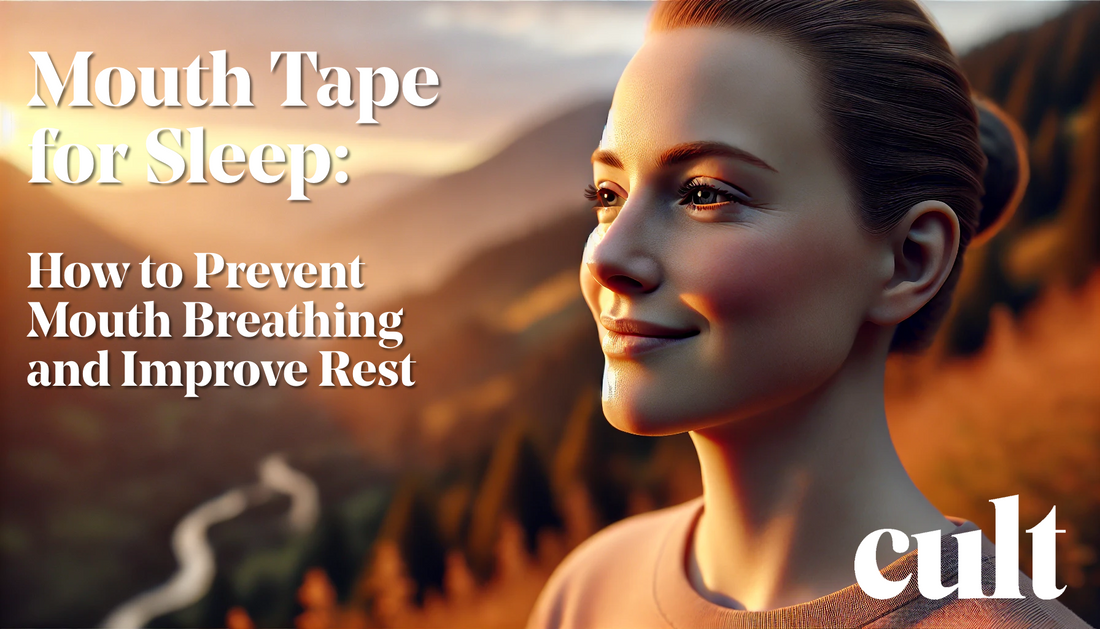
Mouth Tape for Sleep: How to Prevent Mouth Breathing and Improve Rest
Share
Breathing is automatic, right? Not always. If you’re waking up with a dry mouth, a scratchy throat, or worse—feeling just as tired as when you went to bed—you might be breathing wrong at night. Mouth breathing, especially during sleep, can disrupt your rest, cause snoring, and even lead to dental issues. But here’s the fix that’s catching on: mouth tape.
Yes, taping your mouth shut while you sleep might sound like a strange idea, but the results are real. Studies have shown that nasal breathing is far more effective than mouth breathing, helping improve oxygen flow, sleep quality, and even oral health. In fact, chronic mouth breathing can lead to poor sleep, dry mouth, and a variety of health issues. If you’re tired of snoring or feeling groggy, mouth tape might be the simple, non-invasive solution you’ve been overlooking.
Let’s dig into how it works, why it works, and how you can start using mouth tape to prevent mouth breathing and improve your overall health.
What is Mouth Breathing?
Mouth breathing is exactly what it sounds like—breathing through your mouth instead of your nose. While this may seem harmless, breathing through your mouth can have several negative impacts, especially during sleep. Nasal breathing is how our bodies are designed to function, and it comes with many benefits, like filtering and humidifying the air we inhale.
When we breathe through our mouths, especially at night, it can lead to a range of issues:
- Snoring: Mouth breathing causes the tissues in your throat to vibrate, which leads to snoring.
- Dry Mouth: Breathing through your mouth dries out your saliva, leading to bad breath and an increased risk of cavities and gum disease.
- Poor Sleep Quality: Mouth breathing can cause frequent waking, shallow sleep, and an inability to enter deeper, restorative sleep cycles.
- Lower Oxygen Levels: Nasal breathing increases the nitric oxide your body produces, which helps improve oxygen absorption in the lungs. Mouth breathing skips this process.
How Mouth Tape Helps Prevent Mouth Breathing
Mouth tape is designed to help you keep your mouth closed during sleep, encouraging nasal breathing instead. When you breathe through your nose, you get better oxygenation, improved air filtration, and more restful sleep.
Mouth taping works by gently sealing the lips together with a specially designed tape. This prevents the jaw from dropping open at night and forces the body to rely on the nasal passage for breathing. Over time, this method can help retrain your body to naturally breathe through your nose, even without the tape.
Follow Us on TikTok
@jointhecultco Mouth taping carries risk. Heres whay you need to know The tape i use is @BreatheBetter CULT #mouthtapingforsleep #mouthtaping ♬ original sound - Breathe Better CULT
-
The Benefits of Using Mouth Tape
1. Improved Sleep Quality
Mouth taping ensures you're breathing through your nose, which allows for deeper, more restorative sleep. Many users report waking up feeling more refreshed, without the grogginess or headaches that often accompany mouth breathing.
2. Reduced Snoring
Snoring happens when airways are blocked, and mouth breathing is a big culprit. By keeping your mouth closed, you reduce the chances of airway obstruction and significantly cut down on snoring.
3. Better Oral Health
Mouth breathing dries out saliva, leading to increased bacteria in the mouth. This can cause cavities, gum disease, and bad breath. Nasal breathing keeps the mouth moist, protecting teeth and gums from these issues.
4. Enhanced Oxygenation
Breathing through the nose allows for better oxygen absorption in the lungs, improving overall circulation and leading to better energy levels throughout the day.
How to Use Mouth Tape Safely
If you're ready to try mouth taping, here are some best practices to get started:
-
Choose the Right Tape: Use mouth tape that is specifically designed for the job, such as Somnifix or medical-grade tape that is gentle on the skin. Avoid using regular household tape, which can be too harsh or difficult to remove.
-
Test it Out First: If you’ve never used mouth tape before, try it during a nap or for short periods while you're awake. This can help you get used to the sensation.
-
Keep it Simple: You don’t need to seal your entire mouth shut. A small strip of tape across the center of your lips is usually enough to prevent your mouth from opening during sleep.
-
Be Cautious: If you suffer from nasal congestion, sleep apnea, or other breathing issues, consult with a healthcare professional before trying mouth tape. It's important to make sure your nasal passages are clear and that you're not obstructing your airflow in any way.
Who Should Avoid Mouth Taping?
Mouth taping isn’t for everyone. If you have difficulty breathing through your nose due to conditions like allergies, deviated septum, or chronic nasal congestion, mouth taping might not be the best option for you. People with sleep apnea or other breathing disorders should also consult a doctor before trying this method, as it could interfere with your treatment.
Common Questions About Mouth Taping
1. Can I use regular tape?
No. Regular tape can be too adhesive and harsh on your skin. Always use a medical-grade tape or a product specifically designed for mouth taping.
2. Will mouth taping feel uncomfortable?
It may feel strange at first, but most people get used to it quickly. Start by using it for short periods during the day to acclimate yourself.
3. How long should I use mouth tape?
This varies from person to person. Some people find they only need to use it for a few weeks to retrain their breathing habits, while others may choose to use it indefinitely for consistent results.
-
Conclusion: Why You Should Consider Mouth Tape to Prevent Mouth Breathing
If you struggle with poor sleep, snoring, or dry mouth, mouth tape could be the answer. It’s a simple, non-invasive solution that helps promote nasal breathing, which in turn improves your overall health and sleep quality. While it might take some getting used to, the benefits of switching from mouth to nasal breathing are clear—and mouth tape can make that transition much easier.
With mouth taping, you can reduce snoring, boost oxygen levels, and wake up feeling refreshed. So why not give it a try? The results might surprise you.

